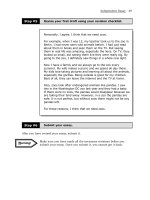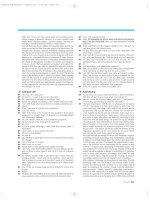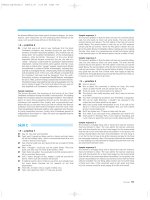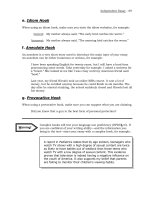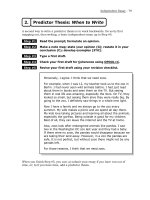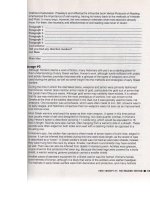Tài liệu Vocabulary for the toefl ibt part 4 ppt
Bạn đang xem bản rút gọn của tài liệu. Xem và tải ngay bản đầy đủ của tài liệu tại đây (132.74 KB, 10 trang )
VOCABULARY IN CONTEXT
23
TOEFL iBT, it is a good idea to become an active reader. This is a skill you can
practice every day. As you read an English-language newspaper or magazine, have
a dictionary handy. Look up as many unfamiliar words as you can so that your bank
of vocabulary words becomes as large as possible.
This may sound like a contradiction, but if you make a habit of taking the time
to read carefully and actively, you will actually spend less time learning the mean-
ing of new vocabulary words. By reading carefully, you will often be able to deter-
mine meaning from context. By reading actively, you will continually expand your
bank of vocabulary words—and the bigger your word base, the more you will com-
prehend, and the less time you will spend looking up words.
TIPS AND STRATEGIES
Vocabulary-in-context questions are common on standardized tests, like the
TOEFL iBT. Here are some specific tips and strategies to use while preparing for
and taking the exam:
●
On any vocabulary-in-context question on an exam, there will be some kind
of context clue to help you determine meaning. Remember the four types:
restatement, positive/negative, contrast, and specific detail.
●
Remember that you have a very powerful tool on a multiple-choice exam:
the process of elimination. From the start, you can usually eliminate one or
two answers that you know are incorrect. For example, you can eliminate
negative choices if the context suggests the word is positive.
●
To help you eliminate answers, read the sentence with each answer choice
substituted for the vocabulary word. Often, putting the word in the context
of the sentence can help you determine whether an answer is right or wrong.
●
Consider the tone and connotation of the other words in the sentence. At
a minimum, this can often help you determine whether the vocabulary word
is positive or negative.
●
Look for introductory words and phrases such as unfortunately, however, sur-
prisingly. These words often tell you whether the word is positive or nega-
tive and/or set up contrast clues.
●
Read carefully. Look for specific details that provide clues to meaning.
●
If you have heard the vocabulary word before but aren’t sure what it means,
try to remember the context in which you heard it used before. This may
help you better use the context as it is presented on the exam.
6044_Vocabulary_ToefliBT(4).qxd 9/19/07 11:44 AM Page 23
VOCABULARY FOR TOEFL iBT
24
PRACTICE QUESTIONS
Choose the best vocabulary word to fill the blank. Circle your choices or write your
answers on a separate piece of paper. Then compare your selections to the correct
answers at the end of the chapter.
1. The _____________ president differs from the past president on healthcare
reform issues.
a. talkative
b. accomplished
c. artificial
d. incumbent
2. The _____________ data supports the belief that there has been an increase
in population in the county.
a. nominal
b. demographic
c. practical
d. nocturnal
3. The _____________ collected from real estate taxes helped to balance the
town budget.
a. domain
b. remainder
c. revenue
d. assessment
4. She pretended to be _____________ about the new job opportunity, but
secretly she was very excited.
a. dedicated
b. receptive
c. candid
d. blasé
6044_Vocabulary_ToefliBT(4).qxd 9/19/07 11:44 AM Page 24
VOCABULARY IN CONTEXT
25
5. We were tired when we reached the _____________, but the spectacular
view of the valley below was worth the hike.
a. circumference
b. summit
c. fulcrum
d. nadir
6. The suit had a(n) _____________ odor, as if it had been stored in a trunk for
a long time.
a. aged
b. scented
c. musty
d. decrepit
7. Because his workplace was so busy and noisy, he longed most of all for
_____________.
a. solitude
b. association
c. loneliness
d. irrelevancy
8. The teacher put the crayons on the bottom shelf to make them
_____________ to the young children.
a. accessible
b. receptive
c. eloquent
d. ambiguous
9. My computer was state-of-the-art when I bought it three years ago, but
now it is _____________.
a. current
b. dedicated
c. unnecessary
d. outmoded
6044_Vocabulary_ToefliBT(4).qxd 9/19/07 11:44 AM Page 25
VOCABULARY FOR TOEFL iBT
26
10. Visiting all the tea shops in the city, they were on a _____________ to find
the perfect cup of tea.
a. surge
b. quest
c. discovery
d. cadence
11. Make sure the directions are very explicit so that no one makes a mistake.
Explicit means
a. intricate, complex.
b. clearly and fully stated.
c. chronologically ordered.
d. ambiguous or implied.
12. The hotel is teeming with security personnel because the leaders of several
countries are here for a summit meeting. Teem means
a. to close down temporarily.
b. to lose business due to circumstances beyond one’s control.
c. to be full of, nearly overflowing.
d. to be under close scrutiny.
13. Karen was relieved to learn that the chemicals in her well water were all
benign. Benign means
a. natural.
b. dangerous.
c. of local origin.
d. harmless.
14. Although it was futile because he didn’t meet half of the requirements,
Jensen applied for the job anyway because it was his dream position. Futile
means
a. useless.
b. fruitful.
c. radical.
d. insane.
6044_Vocabulary_ToefliBT(4).qxd 9/19/07 11:44 AM Page 26
VOCABULARY IN CONTEXT
27
15. The editor, preferring a more terse writing style, cut 500 words from the
2,000-word article. Terse means
a. elegant.
b. factual.
c. descriptive.
d. concise.
16. Victor Frankenstein spent the last years of his life chasing his elusive mon-
ster, who was always one step of his creator. Elusive means
a. difficult to compare.
b. difficult to capture.
c. difficult to forget.
d. difficult to avoid.
17. Xiu’s timely joke served to diffuse the tension in the room, and the rest of
the meeting was highly productive. Diffuse means
a. to refuse.
b. to intensify.
c. to create.
d. to soften.
18. I completely lost track of Tula’s point because she kept digressing to unre-
lated topics. Digress means
a. to deviate, stray.
b. to regress, revert.
c. to change the tone.
d. to express concisely.
19. The senator evaded the question by changing the subject and accusing his
opponent of misconduct. Evade means
a. to escape or elude.
b. to answer indirectly.
c. to refuse to answer directly.
d. to deceive.
6044_Vocabulary_ToefliBT(4).qxd 9/19/07 11:44 AM Page 27
VOCABULARY FOR TOEFL iBT
28
20. Samantha hasn’t said why she’s been so withdrawn lately, but I would sur-
mise that it is because she is still upset about not being able to go to camp.
Surmise means
a. to confirm.
b. to surprise.
c. to believe.
d. to guess.
21. Their conversation was considered playful _______ between two old
friends.
a. antics
b. banter
c. behavior
d. activities
22. He tried to ______________ the sinking morale of his friend in the hospital.
a. sustain
b. foster
c. bolster
d. nourish
ANSWERS
How did you do on identifying context clues? Check your answers here, and then
analyze the results to figure out your plan of attack for mastering this topic.
1. d. Incumbent means holding any post or position.
2. b. Demographic data is the branch of research that deals with human popu-
lations.
3. c. Revenue is the income of a government.
4. d. Blasé means bored or unimpressed by things after having seen or experi-
enced them too often.
5. b. The summit means the highest point, where the hikers would have a
good view.
6. c. A musty odor is one that is stale or moldy.
7. a. Solitude, unlike loneliness, can be a desirable thing, and it would be
something a person who works in a busy office would crave.
8. a. Accessible means capable of being reached or being within easy reach.
6044_Vocabulary_ToefliBT(4).qxd 9/19/07 11:44 AM Page 28
VOCABULARY IN CONTEXT
29
9. d. Outmoded means no longer in style or no longer usable.
10. b. A quest is a search or pursuit of something, in this case for the perfect
cup of tea.
11. b. Explicit means clearly and fully stated; straightforward, exact. The con-
text tells you that the directions need to be clear to prevent an error. If the
directions are clearly and fully stated, it will help ensure that no one makes
a mistake.
12. c. To teem means to be full of, to be present in large numbers. Numerous
security personnel typically surround the leader of a country. If there is a
meeting of several foreign leaders, there is likely to be a great number of
security officers in the hotel.
13. d. Benign means not harmful or malignant; gentle, mild, having a beneficial
effect. Choice d is the only answer that makes sense in the context of the
sentence; Karen would logically be worried about chemicals in her water
and relieved if she learned those chemicals were harmless.
14. a. Futile means useless, producing no result, hopeless, vain. Jensen’s appli-
cation is useless because he does not meet the minimum requirements for
the job.
15. d. Terse means concise, using no unnecessary words. The main clue is that
the editor cut the article by 25%, dramatically reducing its wordiness.
16. b. Elusive means evasive, eluding the grasp; difficult to capture. The sen-
tence tells you that Dr. Frankenstein was never able to catch the creature,
who constantly escaped his grasp.
17. d. To diffuse means to spread throughout, disperse; to soften or make less
brilliant. Xiu’s joke softened the tension so that the meeting could be more
productive.
18. a. To digress means to turn aside, deviate; to stray from the main subject in
writing or speaking. The speaker loses track of the point because Tula
keeps shifting from the main topic to unrelated subjects.
19. a. To evade means to elude or avoid by cleverness or deceit; to avoid fulfill-
ing, answering, or doing. The senator avoids answering the question by
changing the subject.
20. d. To surmise means to form a notion from scanty evidence. The narrator is
guessing that Samantha has been withdrawn because she is upset about not
being able to go to camp.
21. b. Banter is defined as remarks or talk that is playful and teasing. Choice a
is incorrect because antics are unpredictable behavior or actions. Choices c
and d are incorrect because their definitions are too broad and do not focus
on conversation.
6044_Vocabulary_ToefliBT(4).qxd 9/19/07 11:44 AM Page 29
VOCABULARY FOR TOEFL iBT
30
22. c. If the friend has a “sinking morale,” this means that the friend’s feelings
or attitude are overwhelmed or defeated. The speaker would, thus, want to
raise or bolster this morale. Choice a, b, and d are all incorrect. The speaker
would not want his friend’s morale to continue to sink.
6044_Vocabulary_ToefliBT(4).qxd 9/19/07 11:44 AM Page 30
W
hen you come across unfamiliar words without context, breaking
those words into their parts can help you determine their meaning. This
chapter reviews prefixes and suffixes and how you can use them to add new words
to your vocabulary—and better understand words you already know.
A good knowledge of prefixes and suffixes is essential to building an effective
vocabulary. The more familiar you are with these fundamental word parts, the eas-
ier it will be to determine the meaning of unfamiliar words.
There are dozens of prefixes and suffixes in the English language. Learning pre-
fixes and suffixes in another language may seem like a daunting task, but the job may
be easier than you think. Though prefixes and suffixes often appear in books like
this with sophisticated vocabulary words, you are already using the same prefixes
and suffixes with simple words that you already know well.
PREFIXES
Prefixes are syllables attached to the beginning of words to change or add to the
meaning of the root word in some way. For example, the word prefix itself uses the
prefix pre-, meaning before. Thus the meaning of the root word, fix, changes:
Using Prefixes and Suffixes
3
31
6044_Vocabulary_ToefliBT(4).qxd 9/19/07 11:44 AM Page 31
VOCABULARY FOR TOEFL iBT
32
fix: to place securely or firmly
prefix: something placed at the beginning of a word
Several of the vocabulary words you studied in Chapter 2 used prefixes, includ-
ing inept, which uses the prefix in-, meaning not—not suitable or competent.
ON YOUR OWN
IMMERSE YOURSELF IN WORDS
Get in the habit of noticing words all the time. Carry a small notebook with you and
write down interesting words as you encounter them in your daily life. Don’t know
how to spell a word you hear? It doesn’t matter—write it down just as it sounds to
you and look it up later.
Knowledge of prefixes can help you in many ways as you build your vocabulary
and as you prepare for the TOEFL iBT. Although you can’t determine meaning
based on a prefix alone—you also need to know the root of the word—you can often
use a prefix to determine whether a word is positive or negative, to eliminate incor-
rect answers, and to provide partial context for the meaning of the word. For exam-
ple, take the word polyglot. If you know that the prefix poly- means many, you can
eliminate all but the correct answer in the following question:
➥ A polyglot is someone who
a. is an expert in global issues.
b. administers lie detector tests.
c. is easily frightened.
d. speaks many languages.
Choice d is the only answer that includes the idea of many or multiple. Thus, it
is the only possible correct answer.
DEFINITIONS
root: the main part of a word; the base upon which prefixes and suffixes are added
prefix: syllable(s) attached to the beginning of a word to change or add to its
meaning
suffix: syllable(s) attached to the end of a word to change or add to its meaning
You will not always be so lucky as to eliminate all of the incorrect answers, but
even eliminating two or three will be a great help. For example, knowing that the
O
U
6044_Vocabulary_ToefliBT(4).qxd 9/19/07 11:44 AM Page 32

